UnitWherewouldyouliketovisit9(00002)
UnitWherewouldyouliketovisit教案9
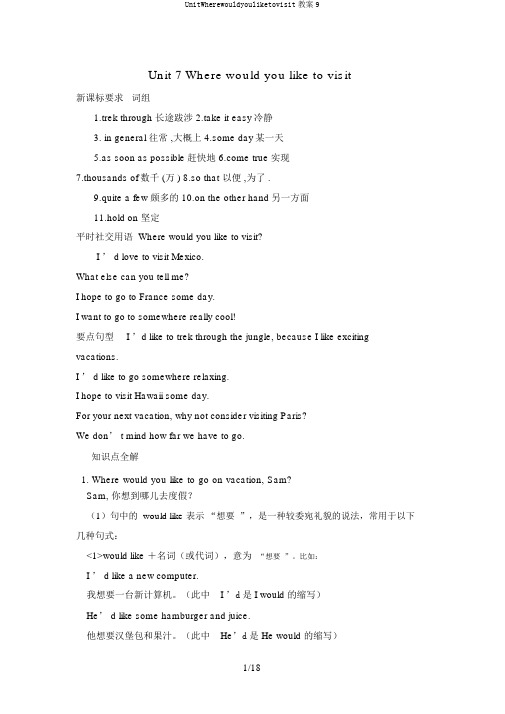
Unit 7 Where would you like to visit新课标要求词组1.trek through 长途跋涉2.take it easy冷静3. in general 往常 ,大概上4.some day某一天5.as soon as possible赶快地e true实现7.thousands of数千 (万 ) 8.so that 以便 ,为了 .9.quite a few 颇多的 10.on the other hand另一方面11.hold on 坚定平时社交用语 Where would you like to visit?I ’ d love to visit Mexico.What else can you tell me?I hope to go to France some day.I want to go to somewhere really cool!要点句型I ’d like to trek through the jungle, because I like exciting vacations.I ’ d like to go somewhere relaxing.I hope to visit Hawaii some day.For your next vacation, why not consider visiting Paris?We don’ t mind how far we have to go.知识点全解1.Where would you like to go on vacation, Sam?Sam, 你想到哪儿去度假?(1)句中的 would like 表示“想要”,是一种较委宛礼貌的说法,常用于以下几种句式:<1>would like +名词(或代词),意为“想要”。
比如:I ’ d like a new computer.我想要一台新计算机。
九级英语UnitWherewouldyouliketovisit教案
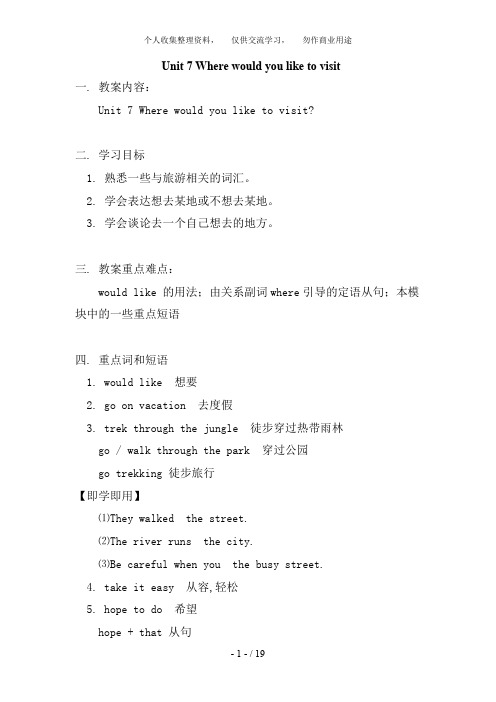
Unit 7 Where would you like to visit一. 教案内容:Unit 7 Where would you like to visit?二. 学习目标1. 熟悉一些与旅游相关的词汇。
2. 学会表达想去某地或不想去某地。
3. 学会谈论去一个自己想去的地方。
三. 教案重点难点:would like 的用法;由关系副词where引导的定语从句;本模块中的一些重点短语四. 重点词和短语1. would like 想要2. go on vacation 去度假3. trek through the jungle 徒步穿过热带雨林go / walk through the park 穿过公园go trekking 徒步旅行【即学即用】⑴They walked the street.⑵The river runs the city.⑶Be careful when you the busy street.4. take it easy 从容,轻松5. hope to do 希望hope + that 从句6. some day (将来)有一天one day (将来)有一天/(过去)一天7. consider doing sth 考虑做某事consider sb. to be sth. 把……视为……consider sb as 认为……【即学即用】⑴I’m considering my hotel, I will come and leave my new address in a few days.A. to changeB. changedC. changeD. changing⑵This book is considered a great help to students of English.A. to beB. beingC. isD. was8. the capital of sp ……的首都 / 省会9. one of the liveliest cities in Europe 欧洲最有活力的城市之一one of the most famous churches in the world 世界上最著名的教堂之一10. fantastic sights 奇妙的景色11. in general 通常12. quite an expensive place 一个高消费的地方13. translate things for sb 为某人翻译事情14. unless 除非【即学即用】⑴除非天气很冷,我爸爸通常开着窗户睡觉。
人教版九级英语UnitWherewouldyouliketovisit教案
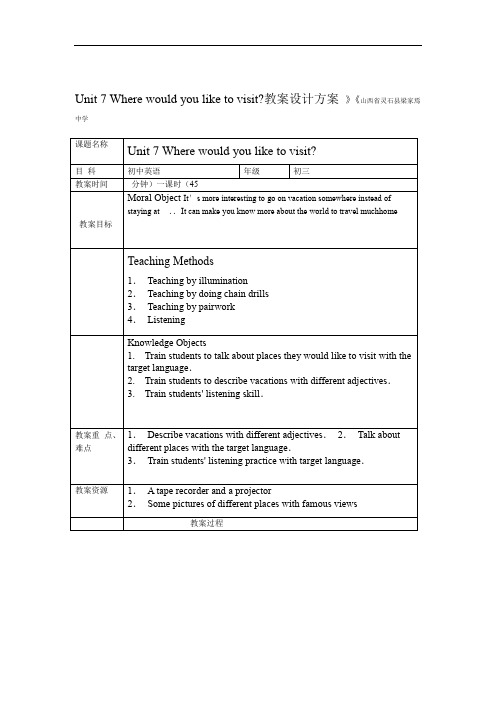
Unit 7 Where would you like to visit?教案设计方案》《山西省灵石县梁家焉中学
修改说明单词的学习放在句中或短语中或是某个情境:在学习过程中,曾有一
位老师讲到中要比单独记单词效果要好,我修订的这部分就是本节课单词新授的环节,原先只是把单词单独放在屏幕上学,修改后是出示图片让学生感受这个单词的意思,教了单词的发音后,就让学生根据图片用这一新单词来说话,因为学生是在用的基础上记单词,这样的效果要比单独教单词好的多。
校本研修过程
4 / 4。
Unit 3 Where would you like to visit 重点单词详解

8. RECEIVE【VT】接收、收到
• receive sth. from sb/ sth He received an award for bravery from the government.
9. AS SOON AS 一---就---
• As soon as he finished his homework, he left school. • As soon as possible 尽早地、尽快的
• 2)姿势 Her hands were folded in the attitude of prayer.
• 2)结束、结局 the conclusion of the book
• 3) In conclusion 最后(=finally)In conclusion, I would like to thank----
13. ATTITUDE 【C】
• 1)态度、看法 attitude to/ towards--- 对---的态度 We should change public’s attitude to marriage.
It’s convenient for us to take the bus now.
• 注意convenient不能用人作主语 例:正:Please come at six if it’s convenient for you.
• convenient.
误:Please come at six if you’re
• 2)Be supposed to do 应该、应当、须 You’re supposed to buy a ticket.
• 3)supposing that假设 Supposing that he is right, what should we do then.
初中英语Wherewouldyouliketovisit单元教学设计以及思维导图

适用年级
八年级下册(鲁教版五四制)
所需时间
课内 5 课时(每周 5 课时),课外 1 课时。
主题单元学习概述
在本单元中,学生学习谈论他们喜欢去的地方,这个话题容易引起学生的兴趣,能进一步训练学生的口语 表达能力。通过本单元的学习学生能表达自己的情绪和情感,学习阅读旅游文章,并且学会为风景区做介 绍。能够激发学生热爱祖国大好河山并激起学生热爱自然环境和保护环境的责任感和使命感。 本单元的知识体系是延续了上一单元的定语从句的用法,并着重是关于 Where,when 引导的定语从句的 学习。尽管定语从句很难,但通过学习和反复练习,学生的综合能力会有很大的提高。 教学重点与难点: 根据新课程标准和学生的特点,确定如下的知识点为本单元的重点: (1)重点词汇和短语的拼读及运用: jungle, thrilling, fascinating, peaceful, take it easy, tiring, educational, trek, touristy, pack, light, consider, provide, including 等。 (2)重点句型:Where would you like to go on vacation? I’d like to trek through the jungle, because I like exciting vacations. (3)学会根据相关的信息进行旅游景点介绍。 本单元的预期学习成 果: 完成听力任务,模仿录音进行分角色朗读、背诵,并编对话,学生能对 3a 进行复述,并独立写作。学生能
save money by cooking our own meals
big enough for 3 people
初中英语《Wherewouldyouliketovisit》单元教学设计以及思维导图
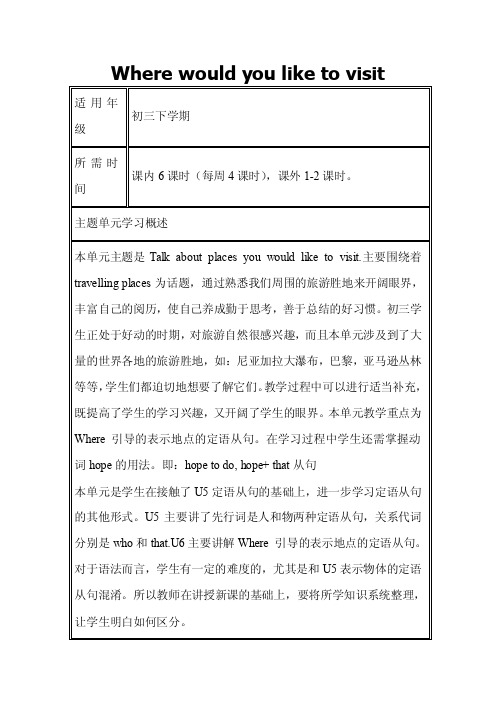
主题单 元问题 设计
1.Where would you like to visit on vacatioon? 2.What do you think of Paris? How do you travel around it? 3.What kind of travel would you like? 4. What are your hopes and dreams? How to achieve them?
Where would you like to visit
适用年 初三下学期
级
所需时 课内 6 课时(每周 4 课时),课外 1-2 课时。
间
主题单元学习概述
本单元主题是 Talk about places you would like to visit.主要围绕着 travelling places 为话题,通过熟悉我们周围的旅游胜地来开阔眼界, 丰富自己的阅历,使自己养成勤于思考,善于总结的好习惯。初三学 生正处于好动的时期,对旅游自然很感兴趣,而且本单元涉及到了大 量的世界各地的旅游胜地,如:尼亚加拉大瀑布,巴黎,亚马逊丛林 等等,学生们都迫切地想要了解它们。教学过程中可以进行适当补充, 既提高了学生的学习兴趣,又开阔了学生的眼界。本单元教学重点为 Where 引导的表示地点的定语从句。在学习过程中学生还需掌握动 词 hope 的用法。即:hope to do, hope+ that 从句 本单元是学生在接触了 U5 定语从句的基础上,进一步学习定语从句 的其他形式。U5 主要讲了先行词是人和物两种定语从句,关系代词 分别是 who 和 that.U6 主要讲解 Where 引导的表示地点的定语从句。 对于语法而言,学生有一定的难度的,尤其是和 U5 表示物体的定语 从句混淆。所以教师在讲授新课的基础上,要将所学知识系统整理, 让学生明白如何区分。
Where would you like to visit教学设计内容

Where would you like to visit?一、教材分析:本案例选材为九年级新目标英语的unit7的section a部分。
在八年级第九单元的基础上,要教会学生使用句型“---where would you like to visit?---I would like to visit brazil.”来讨论参观旅游。
同时扩充学生知识面,了解更多关于当地的风土人情,地理环境,人文教育等社会情况,渐渐达到胸中有世界的宽广胸怀!二、学生分析:本案例所教育对象为普通中学的初三学生。
他们淳朴自然真实,有着强烈的求知欲望,希望能有更多的机会了解并体验外面社会的出色。
但由于所处环境而使其知识面相对较窄。
希望能通过本案例的实施引导学生帮助学生获取更多的知识。
三、教学目标:1、language goal: 1) to master the description words;2) sentence pattern2、ability goal: can use the words and patterns to talk about the places to visit freely and get information from others.3、emotional goal:1) to get more happiness from life and keep an active attitude to life;2) to learn more advantages from others and do more for the society四、教学过程:a,课前任务:让学生收集感爱好国家的地理概况、风土人情、人文教育、社会经济等方面的资料(书面或视频)b,课堂任务:task1视频欣赏让学生欣赏并用英语描述关于旅行的视频。
教师适时地加以提示和补充,同时引入新单词。
task2目标语呈现给学生展示世界地图,提问学生where would you like to visit? why?让学生回答i would like to visit…,并帮助学生用刚学的单词讲述理由(because i want a peaceful trip.)task3目标语操练pair work,适时操练目标语。
新目标九级UnitWherewouldyouliketovisit教案
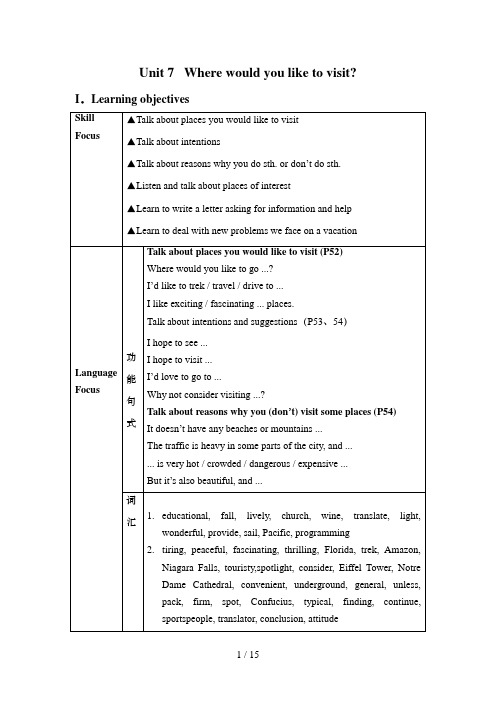
Unit 7 Where would you like to visit? I.Learning objectivesIII. Teaching plans for each periodPeriod 1Language goals1. Words && expressionstiring, relaxing, educational, peaceful, jungle2. Key sentences (P52)Where would you like to go on vacation, Sam?Ability goalsEnable the Ss to talk about places they would like to visit.Emotion && attitude goalsEnable the Ss to love the nature.Strategy goalsListening for key words.Culture awareness goalsLearn about some scenery spots around the world.Teaching important points Talk about places you would like to visit and the intentions.Teaching procedures and ways Step I Lead-in (1a:P52)T: Have you ever been to the Great Wall?S1: Yes, I have been to.S2: No, I have never been to.T: I have been to the Great Wall. Last summer I visited it. I like the Great Wall very much. Besides, I would like to visit the SummerPalace. How about you?S3: I’d like to visit Qingdao next summer vacation.S4: I would like to pay a visit to Xi’an.T: I’d like to visit the SummerPalace, because it’s exciting.Write the word “exciting” on the blackboard.T: Do you know what this word really means? Can you think of something else that is exciting? I will give you some clues. For example, it was an exciting day when I went swimming with my friends.S5: Yes, I guess it means something that makes us happy. We can say that collecting stamps, going swimming and going shopping are all exciting.T: Good. That’s right. Do you know which words have the opposite meaning?S6: “Boring” is just the opposite of “exciting”, I think.T: Yes, Good. Can you make a sentence with these two words?S6: Yes, let me try. Having a vacation is exciting while playing chess is boring.T: You did a good job. Can you give me some words to describe a vacation?Then list the words “tiring”, “educational”, “peaceful”, “relaxing”, “thrilling” and “fascinating” on the blackboard.T: Most of you have been to different places for your vacations. Some places are relaxing, while some may be thrilling and dangerous, so we must be careful on our trip. Now please open your books to page 52 and look at the posters in the picture, what can you see in the posters?S7: In the first poster I can see a beach and a man lying on it.T: Can you read the words?S7: Yes. Take it easy on a FloridaBeach!T: Then if you are asked to give a brief description of the beach, which words would you like to use?S7: I think the beach is fascinating, peaceful and exciting.T: Very good, sit down. And who would like to say something about the second poster? S8: Let me try. In the second poster we can see a man holding a knife. This is a poster for a travel to Brazil. I think trekking through the Amazon jungle is dangerous and thrilling, but at the same time, it is exciting.Step II Listening (1b: P52)Ask the Ss what they should do before listening.T: What should you do if you are going to do some listening practice?S9: I think we should know, first, what we are asked to do.T: Then what you are asked to do according to the instruction in 1b?S10: To fill in the chart with the places that Sam and Gina would like to go to on vacation and the reasons.T: Good. From the chart we can see Sam wants to go to Brazil because he likes exciting vacations. Do you know where Gina wants to visit? And why? What’s more, sometimes you’d better write some key words on the paper while you are listening.Ask the Ss to listen to the tape, finish the exx. and then check the answers.Step III Pairwork (1c: P52)T: Now please work in pairs. Suppose you two are the persons in the picture in 1a. Make conversations to tell your partners the place you would like to visit, the Florida beach or the Amazon jungle of Brazil? Why?S2: I’d like to trek through the jungle. I think it must be very exciting to trek through the jungle, though it is to some extent dangerous and thrilling. What about you? Step IV HomeworkAsk the Ss to:1. do more practice as required in 1c on page 52.2. prepare for the next period: Think about a good place you want to travel to.Period 2 PracticeLanguage goals1. Words && expressions Niagara Falls, touristy,consider, lively, Eiffel Tower, Notre Dame Cathedral, church, convenient, underground, general, in general, wine, unless, translate, pack2. Key sentencesI love places where the people are really friendly. I hope to visit Hawaii one day. Ability goals Enable the Ss to talk about intentions.Emotion && attitude goals Enable the Ss to know some places of interest. Strategy goals Listening for key words。
UnitWherewouldyouliketovisit9(00001)
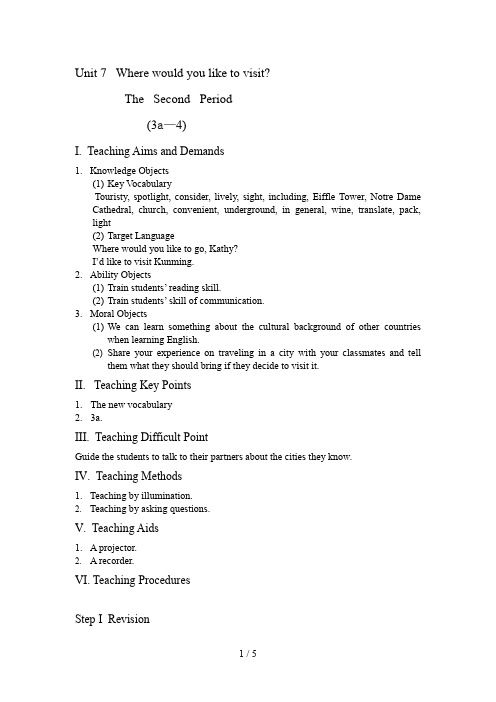
Unit 7 Where would you like to visit?The Second Period(3a—4)I. Teaching Aims and Demands1.Knowledge Objects(1)Key V ocabularyTouristy, spotlight, consider, lively, sight, including, Eiffle Tower, Notre Dame Cathedral, church, convenient, underground, in general, wine, translate, pack, light(2)Target LanguageWhere would you like to go, Kathy?I’d like to visit Kunming.2.Ability Objects(1)Train students’ reading skill.(2)Train students’ skill of communication.3.Moral Objects(1)We can learn something about the cultural background of other countrieswhen learning English.(2)Share your experience on traveling in a city with your classmates and tellthem what they should bring if they decide to visit it.II. Teaching Key Points1.The new vocabulary2.3a.III. Teaching Difficult PointGuide the students to talk to their partners about the cities they know.IV. Teaching Methods1.Teaching by illumination.2.Teaching by asking questions.V. Teaching Aids1. A projector.2. A recorder.VI. Teaching ProceduresStep I Revision1.Revise attributive clause by doing some exercises.Fill in the blanks with who,which,that,whom,whose and where.1)Do you know the girl ___ has long hair?2) I like movies ____ have scary monsters.3) The boy ____ your mother teaches is Tom.4) We are talking about the girl ____ T-shirt is white.5) I often go to Beijing ____ is a beautiful city.6) I like Beijing _____ the food is delicious.2.Revise the target language they learned last class by asking Where would you liketo go on vacation? Show pictures and get several children to answer it.Step II 3a1.Lead-in. Show a picture of France and let the students guess which country it is.After the students answer, the teacher can say, ‘Today let’s go together to learn something about Paris.’2.Show the questions and let the students read 3a.3.Choose several students to answer the questions and check.4.Let the students find out some useful expressions in 3a. And the teacher canexplain some difficult points.5.Read the useful expressions.Step III 3b1.Ask two students to read the sample conversation in Activity 3b.2.Show the pictures of the four cities and let the students model other conversationswith the words given.3.Let the whole class practice in pairs.4.Ask some more pairs to share their conversations with their classmates.Step IV Part 41.Say, First think of a city you know, everyone.2.The teacher can introduce a city to the students and then let the students talk aboutwhat they like and dislike about the cities they write.3.Let them fill in the chart and talk to their partners.Step V Exercise1.Why not ____ (stay) at home?2.I’m considering ____ (speak) French.3.The pen ___ me 50 yuan last week.A. spentB. costC. took4. France has many fantastic sights, i_____Eiffel Tower and Notre Dame Cathedral.5. Shanghai is one of ____ cities in the world.A. beautifulB. more beautifulC. the most beautiful Step VI HomeworkWrite a short passage on the city you talked about in class.Step VII Blackboard DesignUnit 7 Where would you like to visit?Section AThe Second PeriodDalianThings you like: Things you don’t likewonderful beaches too expensive thingslong coast too many carsbig and nice parksthe big museum of different kinds of sea animalsUnit 7 Where would you like to visit?The Second Period(3a—4)园园屯里中学。
UnitWherewouldyouliketovisit()
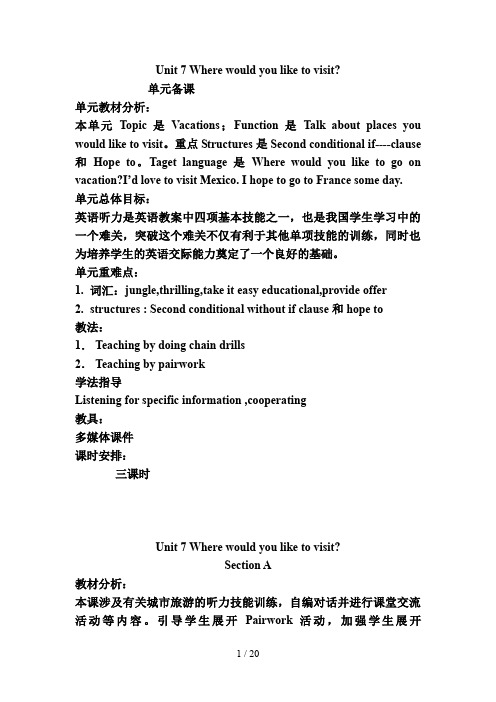
Unit 7 Where would you like to visit?单元备课单元教材分析:本单元Topic是Vacations;Function 是Talk about places you would like to visit。
重点Structures 是Second conditional if----clause 和Hope to。
Taget language 是Where would you like to go on vacation?I’d love to visit Mexico. I hope to go to France some day.单元总体目标:英语听力是英语教案中四项基本技能之一,也是我国学生学习中的一个难关,突破这个难关不仅有利于其他单项技能的训练,同时也为培养学生的英语交际能力奠定了一个良好的基础。
单元重难点:1.词汇:jungle,thrilling,take it easy educational,provide offer2.structures : Second conditional without if clause 和 hope to教法:1. Teaching by doing chain drills2. Teaching by pairwork学法指导Listening for specific information ,cooperating教具:多媒体课件课时安排:三课时Unit 7 Where would you like to visit?Section A教材分析:本课涉及有关城市旅游的听力技能训练,自编对话并进行课堂交流活动等内容。
引导学生展开Pairwork活动,加强学生展开Pairwork活动,让学生实现自主性的学习,进行有目的、有选择的学习活动,从而实现自主性发展。
教案目标:1.Knowledge Objects(1) Key Vocabularytiring, educational, fascinating, thrilling, peaceful, exotic, trek, jungle, take it easy, explore, historic, site(2) Target LanguageWhere would you like to go on vacation?I’d like to trek through the jungle, because I like exciting vacations.2. Ability Objects(1)Train students to talk about places they would like to visit with the target language.(2)Train students to describe vacations with different adjectives.(3)Train students’ listening skill.教案重点1. Key Vocabularytiring, educational, fascinating, thrilling, peaceful, exotic, trek, jungle, take it easy, explore, historic, site2. Terget LanguageTalk about different places with the target language.教案难点1. Describe vacations with different adjectives.2. Talk about different places with the target language.教法1. Teaching by doing chain drills2. Teaching by pairwork学法指导Listening for specific information ,cooperating教具:多媒体课件课时:第一课时教案过程:Step Ⅰ Revision1. Revise the language points in Unit 6.Provides some questions, What kind of music do you like/love/prefer? What kind of clothes/writers/movies/… do you like/love/prefer? Then ask two pairs to make model conversations to the class to make sure they answer, I like/love/prefer music that…I prefer writers who…Next ask students to practise in pairs.Walk around the classroom listening to them, correct some errors they may make and be sure they are answering with sentences with relative clauses.2.Revise the words and expressions in Unit 6 by dictating the following:lyric, remind of, entertainment, exhibition, gallary, on display, energy, suggest, photograph, suitStep Ⅱ 1aThis activity trains students to use the new vocabulary to describe the vacations.At first introduce the key vocabulary.Point to the words and teach the children to read them several times till they can pronounce the words fluently and correctly.After that, try to let students explain the adjectives and make up sentences with them. For example, exciting, do like this:Let’s try to explain some new adjectives in our own words and make up some sentences now. See exciting first. Who can explain it in your own words in English?What does exciting mean?Help the children to explain it. Exciting means not boring, or means hard to be quiet.Who can make up a sentence with it?Give an example sentence with it, please.Ask several ones to say their sentences to the class. For example, Surfing makes us exciting.The boy is very exciting when he is watching a football match.Read the instructions to the students. Be sure that everyone knows what to do.Tell students to look at the posters in the picture and compare them.We can see three posters. Tell me what you can see in each one.Then discuss the three posters with students. For Poster One, help students to say, It is a beach.A man with sunglasses is sleeping, etc.Do the same to the other two posters.Read the words on each poster to students and then let them readtogether several times. Ask some ones to tell the Chinese meanings of the words to see if they can understand them.Do some explanation if necessary.Call the students’ attention to the chart.Point to vacation 1,2 and 3 in the chart.Say, Let’s choose the adjectives from the box for the three vacations.The adjectives you choose should correspond with the posters.Now let’s use Vacation 1 as a sample.Which adjectives should we choose? Who can tell me?Then ask several students to tell the class the words they’ve chosen. Write down their answers on the blackboard like this: Vacation 1 Take it easy on a Florida beach!Adjectives: relaxing, peaceful, boringWho has got some other adjectives to describe it? Some other adjectives you know, but not in the box?Ask some to say more besides the ones in the box, such as quiet, lazy.Write them on the blackboard, too.Please fill in the chart with the adjectives now. Note to match the posters.Get them to fill in the answers by themselves. As they work, move around the room checking their progress and answering questions they may have.Check the answers.Provide the possible answers on the blackboard.Possible answers includeVacation 1: relaxing, peaceful, boringVacation 2: exciting, tiring, dangerous.educational, fascinating, interesting, fun, thrilling, exoticVacation 3: exciting, educational, peaceful, interestingStep Ⅲ 1bThis activity gives students practice in understanding the target language in spoken conversation. Read instructions to students.We’ll listen to three students talking about where they would like to go on vacation and why.See the sample answers in the chart. Write your answers like that while you hear. Look at the three posters in Activity la and do this part. Each one of the three students, Sam, Gina and Lydia, wants to go to one of the three places.Play the tape for the first time, and tell the students not to write in a hurry, just try to catch the main idea of the dialogue.Then play the recording again. Ask them to write their answers this time.Check the answers.Answers1. Sam, Brazil, likes exciting vacations2. Gina, Japan, has been bored lately3. Lydia, Florida, has been stressed outTapescriptBoy 1: Look at those travel posters. I’d love to go on a vacation.Girl 1: Where would you like to go, Sam?Boy 1: I’d love to go trekking in the Amazon jungle in Brazil.Girl 1: Y ou would?Boy 1: Sure. I like exciting vacations.Girl 1: Wouldn’t that be dangerous?Boy 1: No, not really. How about you,Gina? Where would you like to go?Girl 1: Well, I’ve been kind of bored lately.I think I’d like to see the historical sites in Japan.Boy 1: Hmm, that would be fascinating.What about you, Lydia?Girl 2: Oh, I’m stressed out. I’d just like to relax on a beach… Youknow a beautiful beach in Florida.Boy 1: That sounds peaceful.Step Ⅳ 1cThis activity provides guided oral practice using the target language.Presentate this dialogue, showing some pictures of the places with great interest all over the world and say like this:I’d like to travel to France.I’d love to visit Paris, because I like relaxing vacations.Where would you like to go on vacation, Sam?Ask one student to answer the question.After that let him or her ask another student. Set off a chain drill like this:T: I’d love to visit Paris, because I like relaxing vacations. Where would you like to go on vacation, S1?S1:I’d like to climb Mount Emei, because I like dangerous vacations. Where would you like to go on vacation, S2?S s:I prefer to travel to the USA, because I like exotic vacations. Where would you like to go on vacation, S3?S3…After a team finished get the children to make their own conversations in pairs.Ask two students to read the example in the speech bubbles in Activity la. Tell them to talk about the posters with their partners this time.As students work together, move around the classroom, offering language support as needed.Ask some pairs to say their conversations to the class.Step Ⅴ SummaryIn this class, we’ve learned some adjectives that are used to describe vacations and some other words.We have also learned the targetlanguage—Where would you like to go on vacation? I’d like to trek through the jungle because I like exciting vacations.Step Ⅵ Homework1. Try to remember the new key vocabulary.2.Write out three similar conversations to the example in the picture in Activity 1a.信息反馈:在教案活动中,我注意让学生展开听力口语交流活动,创设较为真实或接近真实的语言交际情景,在具体的情景中去引导学生学习是有Target language,基本实现了教案目标。
九级Unit英文教案Wherewouldyouliketovisit
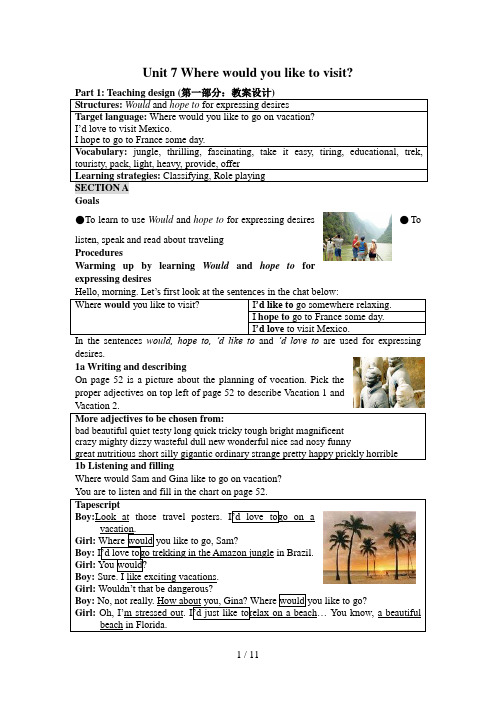
Unit 7 Where would you like to visit?Goals●To learn to use Would and hope to for expressing desires●To listen, speak and read about travelingProceduresWarming up by learning Would and hope to forexpressing desiresdesires.1a Writing and describingOn page 52 is a picture about the planning of vocation. Pick theproper adjectives on top left of page 52 to describe Vacation 1 andWhere would Sam and Gina like to go on vacation?1c Doing pairworkYou are going to practice conversations with your partner according to the vacation posters in 1a.Boy:Do you see those travel posters over there. Let’s goGirl:Boy:Girl:Boy: Sure. I like exciting vacations.Girl:Wouldn’t that be dangerous?Boy:No, not really. How about you, Tian Hong?you like to go?Girl:Oh, I’m stressed out.You know, a beautiful riverside park in Taiyuan.Boy: That sounds peaceful.2a Listening and numberingYou are going to listen to another conversation. This time listen and number the statements on page 53 in the order that you hear them.Now listen to it the second time. Jot down sentences with w ould, hope to, ‘d like toOn page 53 is a chart with “ Place” and “Reason not to visit the place”. Listen againRole play conversations using information from 2a and 2b. You may start this way: A: I hope to visit Hawai some day.B: I do, too. I like places where the weather is always warm.A:I’d like to go on a vacation with my classmate Li Hong.B: I hope to visit Wutai Mountain one day. Would you be interested in going there? A: I like places where the food is really delicious. Zhongqing is a nice place to visit. B: But Zhongqing is too touristy. Maybe we could go to Dali.A:Pingyao would be nice, but we don’t have the time.B:Why don’t we go to Lushan together? It has everything—beautiful views, friendly people, exciting things to do…after class.3b Doing pairworkIn pairs practice the conversation on the middle left of page 54. And then make newB:I’d like to visit Hong Kong.A:Isn’t it supposed to be very crowded?B: Yes, it is. But Kong Kong is also beautiful, and it has lots of great entertainment sights.A: Where would you like to go for the May Day vacation?B:I’d like to see Mexico City.A:Isn’t it supposed to be exciting?B:Yes, it is. But I am going there for a relaxing trip. I don’t have lots to do there.A: Where would you like to visit for the National Day hollidays?B:I’d like to see New York.A:Isn’t it supposed to be very touristy?B: Yes, it is. But it is also a very fascinating place with lots of fantastic galleries.A: Where would you like to spend your Spring Festival vacation?B:I’d like to fly to Sydney.B:Yes, it is. But it is also a very beautiful place withfantastic beaches where you can lie down for a sunbath.A: But you can also lie right here for a free sunbath, too.4 Doing pairworkIn pair you are going to think of a city you know. List thingsyou like and things you don’t like about the city.Terrible DreamI'm feeling rather ragged.I'm feeling rather rough.I'm looking like I stayed up late,and didn't sleep enough.I went to sleep at bedtimeand dreamt all through the night,but when I woke this morningI was feeling far from right.For though I drifted quickly,and slumbered long and deep,I'm totally exhausted'cause I dreamed I couldn't sleep!--Kenn NesbittSECTION BGoals●To practice w ould, hope to, ‘d like to and ‘d love to for expressing desires●To read and write on travelingProceduresWarming up by looking and sayingLook at the picture below and say what the bear wants to say.1 Brainstorming things for vacationAlmost everyone likes traveling, but what things are important to you when you go onJeff is working at a travel agency for the summer vacation. Listen to the conversations and number the pictures on page 55.find out about your vacation packages.On page 56 is an e-mailing message. Read it and check the statements in the chart on , circle the structures for expressing desires, underline the expressionsImagine the you work for Ace Agency. You are to write an email message to S.T.Georgie PorgieGeorgie Porgie, pudding and pie,kissed the girls and made them sigh.He's so cute they stand in linesjust to give him Valentines.--Kenn NesbittSELF CHECK1.Filling blanksOn the top of page 57 is a box with 5 sentences.Read them and fill in a correct given word.(Key: 1. provide 2. cook 3. saving 4. pack 5.hope)Then make your own sentences with each word given.1)hope: “I hope to finish this work tomorrow evening.” “I hope she understands that she cannot expect a raise.”2)pack: “Pack the books into the boxes.” “She packs a gun when she goes into themountains.”3)save: “She saved the old family photographs in a drawer.” “He saves half his salary.” “This move will save money.” “This will save money.”4)provide: “He provides for his large family by working three jobs.” “Provide for the proper care of the passengers on the cruise ship.” “The will provides that each chi ld should receive half of the money.” “The hostess provided lunch for all the guests.” “We provided the room with an electrical heater.”5)cook: “These potatoes have to cook for 20 minutes.” “The apothecary cooked the medicinal mixture in a big iron kettl e.” “Cook me dinner, please.” “Myhusband doesn't cook.”2.Looking and writingOn page 57 are 4 pictures. Write to tell which of theses placesLooking at the pictures below and imagine you are there.Reading: I’d love to sail across the Pacific.Before you read , go over the new words on page 151.While you read , listen to the recording of it, underline all the useful phrases andI. What is travel?Travel is the process of going from one place to another.Most people travel from home to work or school and others travel for fun and sightseeing. Some people write about traveling in books called autobiographies or journals.II. Recommended attractions of Shanxi Province●Yungang Grottoes, Datong●Hengshan Hanging Temple (Xuankong si), Datong●Nine Dragon Screen, Datong●Huayan Si, Datong●Ying Xian Wooden Pagoda, Datong●Mount Hengshan Scenic Spot, Datong●Jin Temple, Taiyuan●Chongshan Monastery, Taiyuan●Qiao's Family Compound (Qiao Jia Dayuan), Pingyao●Wang's Family Compound (Wang Jia Dayuan), Pingyao●Zhenguo Temple, Pingyao●Rishengchang Exchange Shop, Pingyao●Temple of the City God, Pingyao●City Wall of Pingyao, Pingyao●Wall of the Wuzhon mountains, Yungang●Wutai Shan (Five Terrace Mountain), Shanxi●Twin Pagoda Temple (Shuangta si), Taiyuan ●Shuanglin Temple, Pingyao11 / 11。
九级英语Wherewouldyouliketovisit
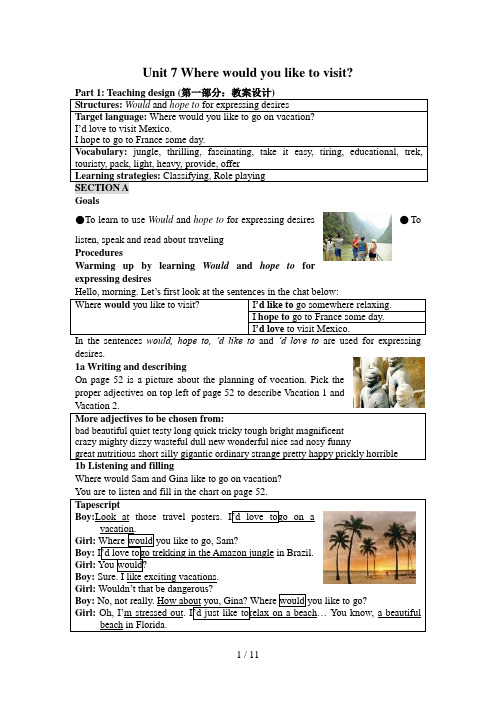
Unit 7 Where would you like to visit?Goals●To learn to use Would and hope to for expressing desires●To listen, speak and read about travelingProceduresWarming up by learning Would and hope to forexpressing desiresdesires.1a Writing and describingOn page 52 is a picture about the planning of vocation. Pick theproper adjectives on top left of page 52 to describe Vacation 1 andWhere would Sam and Gina like to go on vacation?1c Doing pairworkYou are going to practice conversations with your partner according to the vacation posters in 1a.Boy:Do you see those travel posters over there. Let’s goGirl:Boy:Girl:Boy: Sure. I like exciting vacations.Girl:Wouldn’t that be dangerous?Boy:No, not really. How about you, Tian Hong?you like to go?Girl:Oh, I’m stressed out.You know, a beautiful riverside park in Taiyuan.Boy: That sounds peaceful.2a Listening and numberingYou are going to listen to another conversation. This time listen and number the statements on page 53 in the order that you hear them.Now listen to it the second time. Jot down sentences with w ould, hope to, ‘d like toOn page 53 is a chart with “ Place” and “Reason not to visit the place”. Listen againRole play conversations using information from 2a and 2b. You may start this way: A: I hope to visit Hawai some day.B: I do, too. I like places where the weather is always warm.A:I’d like to go on a vacation with my classmate Li Hong.B: I hope to visit Wutai Mountain one day. Would you be interested in going there? A: I like places where the food is really delicious. Zhongqing is a nice place to visit. B: But Zhongqing is too touristy. Maybe we could go to Dali.A:Pingyao would be nice, but we don’t have the time.B:Why don’t we go to Lushan together? It has everything—beautiful views, friendly people, exciting things to do…after class.3b Doing pairworkIn pairs practice the conversation on the middle left of page 54. And then make newB:I’d like to visit Hong Kong.A:Isn’t it supposed to be very crowded?B: Yes, it is. But Kong Kong is also beautiful, and it has lots of great entertainment sights.A: Where would you like to go for the May Day vacation?B:I’d like to see Mexico City.A:Isn’t it supposed to be exciting?B:Yes, it is. But I am going there for a relaxing trip. I don’t have lots to do there.A: Where would you like to visit for the National Day hollidays?B:I’d like to see New York.A:Isn’t it supposed to be very touristy?B: Yes, it is. But it is also a very fascinating place with lots of fantastic galleries.A: Where would you like to spend your Spring Festival vacation?B:I’d like to fly to Sydney.B:Yes, it is. But it is also a very beautiful place withfantastic beaches where you can lie down for a sunbath.A: But you can also lie right here for a free sunbath, too.4 Doing pairworkIn pair you are going to think of a city you know. List thingsyou like and things you don’t like about the city.Terrible DreamI'm feeling rather ragged.I'm feeling rather rough.I'm looking like I stayed up late,and didn't sleep enough.I went to sleep at bedtimeand dreamt all through the night,but when I woke this morningI was feeling far from right.For though I drifted quickly,and slumbered long and deep,I'm totally exhausted'cause I dreamed I couldn't sleep!--Kenn NesbittSECTION BGoals●To practice w ould, hope to, ‘d like to and ‘d love to for expressing desires●To read and write on travelingProceduresWarming up by looking and sayingLook at the picture below and say what the bear wants to say.1 Brainstorming things for vacationAlmost everyone likes traveling, but what things are important to you when you go onJeff is working at a travel agency for the summer vacation. Listen to the conversations and number the pictures on page 55.find out about your vacation packages.On page 56 is an e-mailing message. Read it and check the statements in the chart on , circle the structures for expressing desires, underline the expressionsImagine the you work for Ace Agency. You are to write an email message to S.T.Georgie PorgieGeorgie Porgie, pudding and pie,kissed the girls and made them sigh.He's so cute they stand in linesjust to give him Valentines.--Kenn NesbittSELF CHECK1.Filling blanksOn the top of page 57 is a box with 5 sentences.Read them and fill in a correct given word.(Key: 1. provide 2. cook 3. saving 4. pack 5.hope)Then make your own sentences with each word given.1)hope: “I hope to finish this work tomorrow evening.” “I hope she understands that she cannot expect a raise.”2)pack: “Pack the books into the boxes.” “She packs a gun when she goes into themountains.”3)save: “She saved the old family photographs in a drawer.” “He saves half his salary.” “This move will save money.” “This will save money.”4)provide: “He provides for his large family by working three jobs.” “Provide for the proper care of the passengers on the cruise ship.” “The will provides that each chi ld should receive half of the money.” “The hostess provided lunch for all the guests.” “We provided the room with an electrical heater.”5)cook: “These potatoes have to cook for 20 minutes.” “The apothecary cooked the medicinal mixture in a big iron kettl e.” “Cook me dinner, please.” “Myhusband doesn't cook.”2.Looking and writingOn page 57 are 4 pictures. Write to tell which of theses placesLooking at the pictures below and imagine you are there.Reading: I’d love to sail across the Pacific.Before you read , go over the new words on page 151.While you read , listen to the recording of it, underline all the useful phrases andI. What is travel?Travel is the process of going from one place to another.Most people travel from home to work or school and others travel for fun and sightseeing. Some people write about traveling in books called autobiographies or journals.II. Recommended attractions of Shanxi Province●Yungang Grottoes, Datong●Hengshan Hanging Temple (Xuankong si), Datong●Nine Dragon Screen, Datong●Huayan Si, Datong●Ying Xian Wooden Pagoda, Datong●Mount Hengshan Scenic Spot, Datong●Jin Temple, Taiyuan●Chongshan Monastery, Taiyuan●Qiao's Family Compound (Qiao Jia Dayuan), Pingyao●Wang's Family Compound (Wang Jia Dayuan), Pingyao●Zhenguo Temple, Pingyao●Rishengchang Exchange Shop, Pingyao●Temple of the City God, Pingyao●City Wall of Pingyao, Pingyao●Wall of the Wuzhon mountains, Yungang●Wutai Shan (Five Terrace Mountain), Shanxi●Twin Pagoda Temple (Shuangta si), Taiyuan ●Shuanglin Temple, Pingyao11 / 11。
九年级英语UnitWherewouldyouliketovisit人教新目标版

beautiful tiring educational fascinating fun thrilling
relaxing dangerous peaceful interesting boring exciting
Vacation Vacation
1
2
relaxing
Listen.Where would Sam and Gina like to go on vacation? Why? Fill in the chart.
(2) To enable the Ss to obey the rules of scenic spots, to be a civilized tourist
(3) It′s more interesting to go on vacating somewhere instead of staying at home.
Ⅲ Teaching Key and Difficult Points
1.Key points: (1)Master the new words and phrases (2) To practise and master target languages.
2.Difficult point: 1: Describe vacations with different
sailing
West Sichuan Plateau West lake
Oriental Pearl TV Tower Huangshan
educational fascinating
peaceful thrilling
Write adjectives to describe the vacations in the picture below. Use adjectives from the box and other adjectives you know.
人教新目标版英语九《Unit Where would you like to visit》ppt课件(二)

1 I hope to visit Hawaii one day.
2b listen again.Why do the people decide not to visit these places? Match each place with a reason.
China pavilin in World Expo
in Shanghai
Eiffel tower in Paris in
France
pairwork: ask and answer
If you have a chance to somewhere that you want to visit
Ask like this:
is always warm.
Where would you like to visit?
2c Pairwork
Use the information in 2a and 2b to role play coversation.
• For example:
• A: I hope to visit Hawaii some day. • B: I do,too. I like places where the weather
Lushan Falls in Jiangxi Province
Please make up you own covesation
A: Where would you like to go on vacation? B: I'd like to... A: Why do you like to go there? B: I like places where...
- 1、下载文档前请自行甄别文档内容的完整性,平台不提供额外的编辑、内容补充、找答案等附加服务。
- 2、"仅部分预览"的文档,不可在线预览部分如存在完整性等问题,可反馈申请退款(可完整预览的文档不适用该条件!)。
- 3、如文档侵犯您的权益,请联系客服反馈,我们会尽快为您处理(人工客服工作时间:9:00-18:30)。
Unit 7 Where would you like to visit?编稿:赵吉存审稿:杭海责编:夏芳莲目标认知重点词汇:1. tiring引起疲劳的、累人的2. educational 有教育意义的、教育的3. peaceful和平的、宁静的4. thrilling 令人激动的、令人震颤的5. fall瀑布6. touristy游客众多的、适合游览的7. consider考虑、认为8. lively活泼的、充满活力的9. sight风景、名胜10. including包括、包含11. tower塔、塔楼12. underground地下的13. general一般事物、一般原则14. wine酒、葡萄酒15. translate 翻译16. light轻的17. wonderful 令人惊叹的、绝妙的18. eastern东部的19. provide 提供、供应20. sail航行21. pacific 太平洋22. finding调查、发现物23. continue继续、坚持24. programming编程25. report报告、汇报26. willing乐意的、志愿的27. dream梦想、做梦28. attitude态度重点词组及句型:1. on vacation 在度假、在休假2. take it easy从容、轻松、不紧张3. in general通常、大体上4. as soon as possible 尽快地5. be willing to 乐意做某事6. quite a few相当多、不少7. dream of梦想、幻想8. hold on to坚持9. come true实现10. provide with 给——提供11. be away离开12. continue doing 继续做某事13. all kinds of各种各样的14. according to 根据1. Where would you like to go on vacation, Sam?萨姆,你想到哪里度假?2. I love the places where people are friendly. 我喜欢人们确实友好的地方。
3. I’d like to go somewhere relaxing. 我想去一个令人轻松的地方。
4. For your next vacation, why not consider visiting Paris?你的下一个假期,为什么不考虑去巴黎游览?5. It doesn’t have any beaches or mountains. 它没有海滩和高山。
6. France is quite an expensive place. 法国是一个消费很昂贵的地方。
7. What else can you tell me? 你还能告诉我别的什么吗?8. We don’t mind how far we have to go. 我们不介意必须去多远。
9. We also need to stay in an inexpensive hotel. 我们也需要住一个不昂贵的旅馆。
10. The room needs to be big enough for three people. 房间需要够三个人住那么大。
11. Also, please let us know if it’s best to travel by plane,train or bus.并且请告诉我们最好的旅行方式是乘坐飞机、火车还是公共汽车。
12. You need to pack warm clothes if you go there. 如果你要去那里,你需要带暖和的衣服。
13. We all dream about things that we would like to do,and things we hope to achieve inthe future.我们都梦想着我们要做的事情和我们希望将来获得的东西。
14. Here are some of findings of a survey about hopes and dreams,in which thousands ofstudents across China took part 这是一些关于希望和梦想的调查发现,遍及全中国的几千学生参加了这次调查。
日常用语:1.-Where would you like to visit? 你想去哪里参观?-I’d like to go somewhere relaxing. 我想去某个令人放松的地方。
2. Could you please give me some suggestions for vacation spots?请你给我一些旅游景点的建议好吗?3. I think it would be Paris. 我想它可能是巴黎。
精讲巧练1. Where would you like to go on vacation, Sam?萨姆,你想到哪里度假?(1.)would like是一个固定结构,它的意思是“想要”,相当于动词want,但比want更委婉、礼貌。
它的后面用名词、代词、不定式短语作宾语。
例如:Your brother would like some apples. 你弟弟想要一些苹果。
(2.)would like/love中的would可以缩写成为’d,如果是疑问句可以把would放在句子的前面,否定句在介词to的前面加not。
例如:Would you like to go with me? 你愿意和我一起去吗?I would like not to be late for class. 我不愿意上课迟到。
随时练【考例】-Would you like to go swimming with us?—Yes, __________.A. pleaseB. I would likeC. I wouldD. I’d love to.【答案与解读】答案是D。
would like构成的一般疑问句,它的肯定回答是Yes, I’d love to.2. I love the places where people are really friendly. 我喜欢人们确实友好的地方。
(1.)where是关系副词,表示地点,作引导词来引导定语从句,并且在定语从句中充当地点状语,相当于in the place。
例如:This is the village where my grandfather lived long long ago.这就是我的爷爷很久很久以前住过的村庄。
(2.)really是副词来修饰形容词friendly表示“真的友好、的确友好”的意思。
动词短语be friendly to somebody的意思是“对某人是友好的”。
例如:Our teacher is friendly to us. 我们的老师对我们友好。
随时练【考例】Is this the room ______ you lived one year ago?A. whatB. whereC. whichD. who【答案与解读】答案是B。
本句子是考查定语从句的引导词的用法。
前面的名词room 是表示地点的名词,所以用表示地点的副词where来引导定语从句。
如果用which引导表示地点的定语从句想要在which的前面加介词in。
3. I’d like to go somewhere relaxing. 我想去一个令人轻松的地方。
(1.)somewhere是不定副词,表示某个地方的意思。
relaxing是形容词,当形容词修饰不定副词的时候,形容词放在不定副词的后面。
另外几个不定副词是:anywhere,everywhere,nowhere等。
(2.)形容词修饰不定代词的时候,形容词也要放在不定代词的后面。
不定代词有:somebody,someone,something,anybody,anyone,anything,nobody,nothing等。
随时练【考例】Is there _______ in today’s newspaper?A. something newB. anything importantC. strange somethingD. important anything【答案与解读】答案是B。
本句子是考查不定代词的用法,形容词修饰不定代词的时候要把形容词放在不定代词的后面,本句子是一般疑问句,所以用不定代词anything。
4. For your next vacation, why not consider visiting Paris?你的下一个假期,为什么不考虑去巴黎游览?(1.)句型Why not do something?=Why don’t you do something?该句型用来表示“征求意见或者提出建议”,它的意思是“为什么不做某事?”。
例如:Why don’t you go shopping with me?你为什么不和我一起去购物?(2.)动词consider的意思是“考虑、认为”,它的后面跟名词、动名词或者从句作宾语。
例如:Why don’t you consider visiting Qing Dao?你为什么不考虑去青岛参观?随时练【考例】Let’s consider _____ them with the work.A. helpB. to helpC. helpingD. helps【答案与解读】答案是C。
在动词consider的后面用动名词形式作宾语。
5. It doesn’t have any beaches or mountain. 它没有海滩和高山。
(1.)or在本句子中是表示并列关系,它的意思是“和”,相当于连词and,and用在肯定句中表示并列,在否定句中表示并列用or,在疑问句中用or表示选择关系,它的意思是“或者”。
例如:Do you like apples or bananas? 你是喜欢苹果还是喜欢香蕉?I don’t like math or English. 我不喜欢数学和英语。
随时练【考例】My brother doesn’t like milk______ meat.A. andB. orC. toD. of【答案与解读】答案是B。
本句子是否定句,在否定句中表示并列关系的时候用连词or,而不用连词and。
6. France is quite an expensive place. 法国是一个消费很昂贵的地方。
